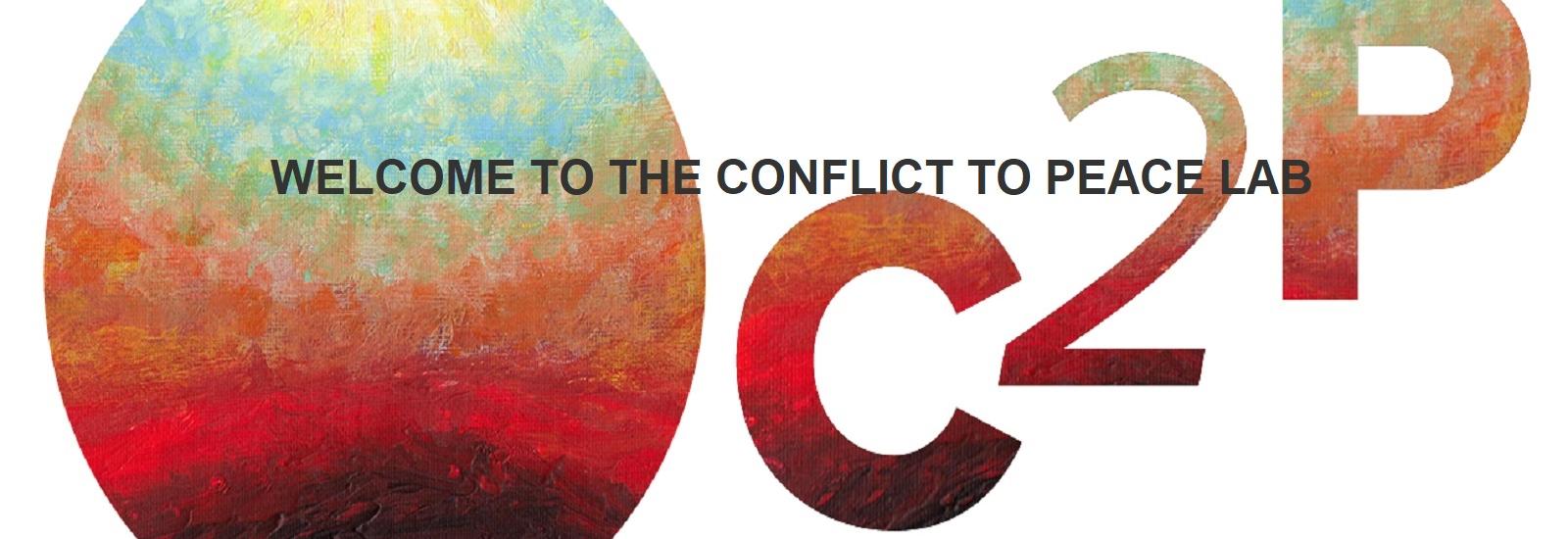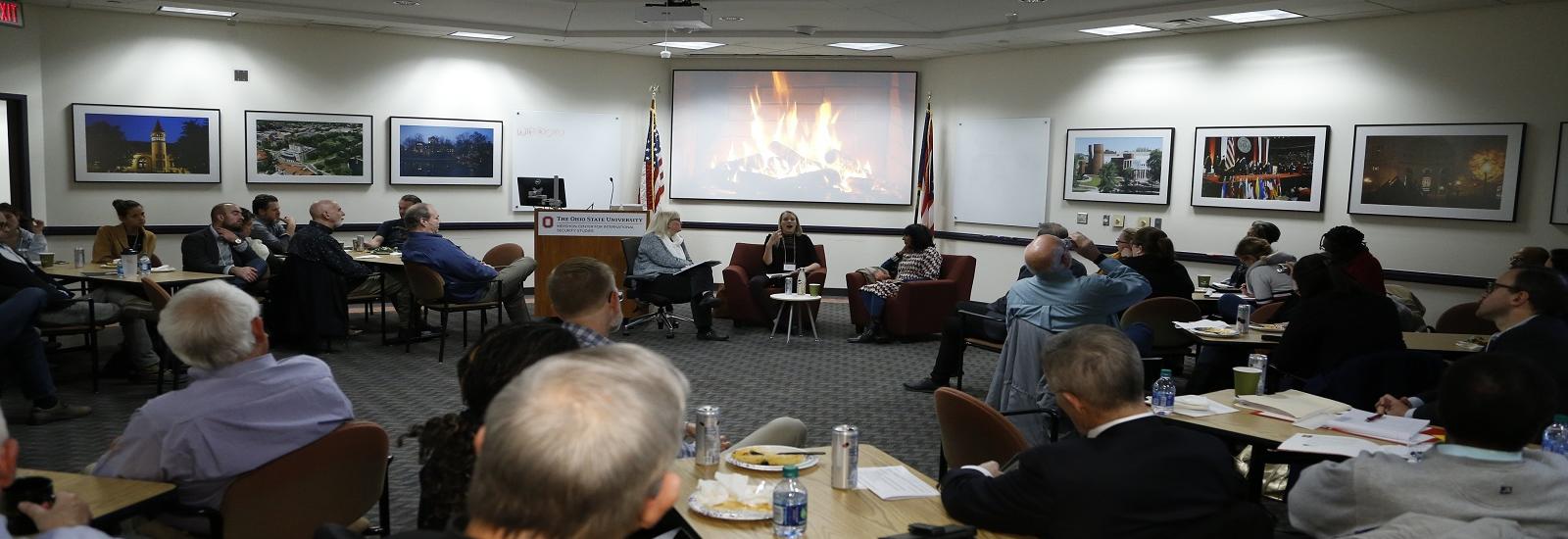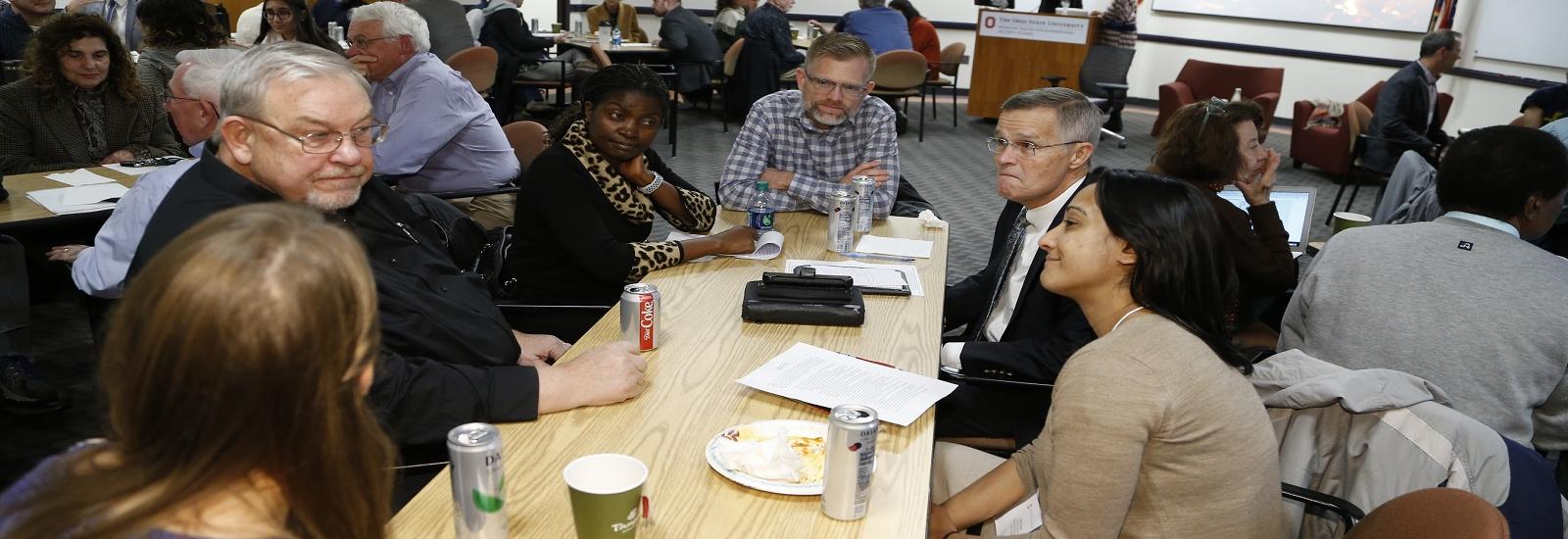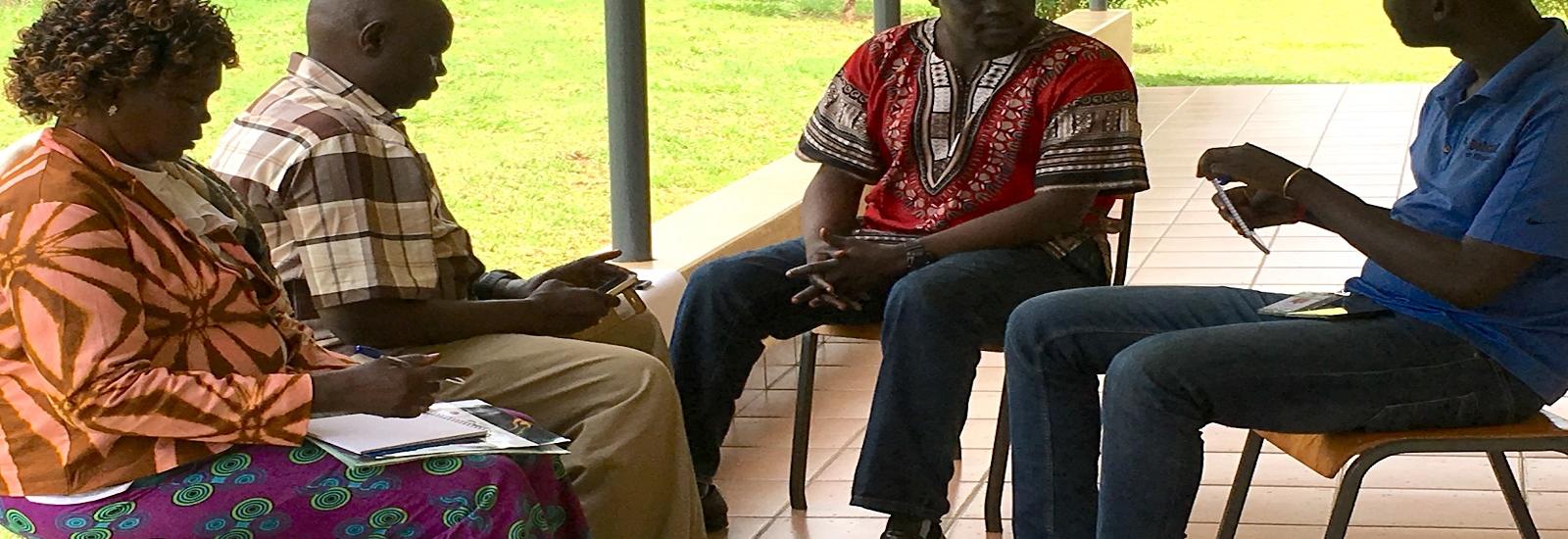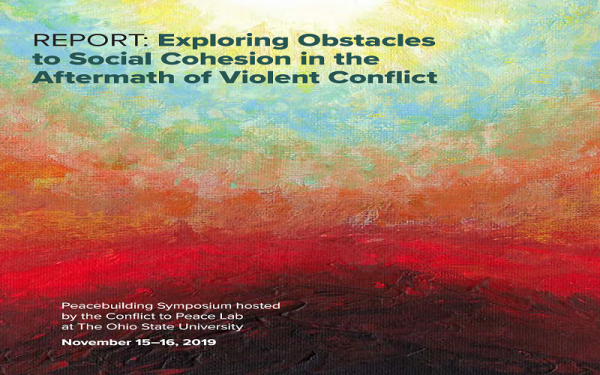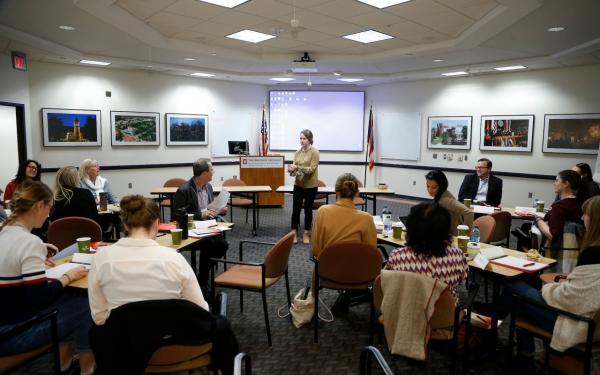Linking good research, effective practice, and sound policy to foster durable peace
About Us
The Conflict to Peace Lab (C2P) is a new research initiative at Ohio State that brings together extraordinary people and partners to catalyze extraordinary change in the communities we serve.
By combining the expertises and perspectives of scholars, policymakers, local partners and funders, we work to encourage communities toward peaceful solutions. We identify the underlying causes of conflict and develop evidence-based evaluations of policy and intervention models that support international peacemaking, peacebuilding, and social cohesion programs in communities affected by war and political violence.
Housed in the Mershon Center for International Security Studies at Ohio State, C2P is guided by compassionate and solution-oriented scholarship, along with people who share a commitment to alleviating violence, stabilizing fragile societies, and developing positive peace.
We believe in the power of collaboration. Our team is composed of researchers and practitioners from diverse backgrounds but who are united in passion and purpose. C2P works with partners on the ground in a spirit of innovation and co-creation to produce valuable research and support and develop the design and evaluations of innovative peace practices.
Because every community is unique, social cohesion cannot be achieved with a one-size-fits-all model. We honor the populations and partners we work with by prioritizing conflict sensitivity and cultural appropriateness to develop tailored approaches to project design and evaluation. By working closely with our embedded partners, we can take care to produce knowledge that is useful to local communities, accessible to practitioners, and actionable for policymakers.
The number of societies affected by political violence has risen steadily over the past decade. Over this same period, the number of deaths resulting directly from political violence has increased to more than 100,000 every year. This violence has even broader impacts on vulnerable communities in fragile states through the spread of sexual violence, famine, forced migration and disease.
C2P partners directly with communities affected by politically motivated violence to identify, evaluate and support the design of peacebuilding interventions that are effective, culturally sensitive and responsive to community needs. To accomplish this goal, we work alongside local organizations and INGOs to identify and embed peace processes and indicators into programmatic frameworks.
We take a mixed methodological approach to evaluating peacebuilding interventions, giving us a comprehensive and dynamic view of the implications of the programs on the communities they serve. Rigorous quantitative and qualitative analysis allows our partners to leverage data in their work to further strengthen their interventions and to instruct future policy considerations. Central to our approach is the creation and sustainment of relationships with local partners— requiring commitment to mutual respect, learning and understanding among all our stakeholders.
Peacebuilding does not end in the field. In addition to our work in conflict-affected communities, we continue to support our partners through presentations, co-authored policy reports, and peer-reviewed publications. We use the lessons from our research and collaborations to develop better tools and facilitate more effective peacebuilding in the future.
Guiding Principles
- Collaboration. We bring together scholars, policy makers, practitioners, local development partners, and donors — who are creative, dedicated and committed to alleviating violence, stabilizing fragile societies and developing positive peace.
- Respect. We are thoughtful partners who prioritize conflict sensitivity and cultural appropriateness in all the areas we work, coordinating closely with local partners and responding to cultural and political conditions.
- Innovation. We lead by identifying and designing innovative approaches in our research, programming and evaluations of vulnerable, fragile and conflict-affected areas, navigating access and security.
- Usefulness. We generate knowledge that is actionable to local communities, accessible to policy makers and practitioners, and compelling to the scholarly community.
Burundi
Project Description: As citizens face the impending political transitions of the 2020 Presidential elections, there is anxiety about the re-emergence of social division and violence. Within this context, faith actors have long been advocates for peace. As a conflict prevention and peacebuilding intervention strategy, this project leverages their role through establishing interfaith platforms at the national and local levels (in 4 provinces and 27 communes). By bringing people together and offering them opportunities to share concerns, build relationships, and offer input to local and regional officials, the aims of these platforms include the following:
- strengthen citizens’ participation and political influence,
- encourage dialogue, enhance social trust and social cohesion, and
- dispel rumours and misinformation through the proactive sharing of critical information (both vertically and horizontally).
Theme: Building Social Trust and Social Cohesion
Strategy: Dialogue through Interfaith Platforms
Partners: The Interfaith Council of Burundi (CICB), Conférence des Evêques Catholiques du Burundi (CECAB), Conseil National des Eglises du Burundi (CNEB) and Communauté Islamique du Burundi (COMIBU), Christian Aid Burundi, Christian Aid Ireland
Research Methodologies: Community-wide experimental survey on citizen perception and attitudes; In-platform survey of platform participants; Focus groups; Interviews; Participant observation
Policy and Intervention: Evaluating interfaith platforms as an effective peace practice; Co-designing and testing dialogue and facilitation training curriculum; Coaching and on-going monitoring and evaluation
Iraq
Project Description: After the military defeat of the Islamic State of Iraq and Syria (ISIS), many communities in northern Iraq and the Kurdistan Region (KRI) face the critical challenge of rebuilding social cohesion in the aftermath of civil conflict. Despite gains in local security and governance, significant obstacles remain to restoring social trust among victims of the conflict. In response, Tearfund has partnered with a local network of peacebuilders from across Iraq’s ethnic and religious communities to support indigenous peacebuilding projects. To strengthen and extend these efforts, Tearfund and the Conflict to Peace Lab (C2P) will work together to develop a strategic plan to assist in the continued development of these efforts.
Theme: Building Social Trust and Social Cohesion; Post-Conflict Peacebuilding
Strategy: Developing and implementing an indigenous peacebuilding curriculum for peacebuilders in Northern Iraq and Kurdistan Region of Iraq (KRI)
Partners: Tearfund
Research Methodologies: Interviews with local peacebuilders and activists, participatory and action research, training and workshops
Policy and Intervention: Development and implementation of university-level curriculum in conflict resolution
Community of Practice: Global Network of Peacebuilders
Project Description: As the complexity of humanitarian crises continues to intensify, peacebuilders in conflict zones are encountering amplified risk. Expressions of violence that they face may include periods of intense open conflict, but often their lives are embedded in latent division that persistently simmers just below the surface. In these fragile locations, the socio-political environment is often polarized, characterized by long-standing identity-based animosities that fuel cyclical outbreaks of violence. This repetitive history of violence and violation is up close and personal. It is often traumatic and also shared. People engaging on the “front-lines” of conflict are especially prone to being impacted by these dynamics. C2P is working with Tearfund/UK to learn how to better equip, connect, and nurture the capacities of peacebuilders, in order to strengthen their resilience as they provide effective service in these complex settings. The aim of this Community of Practice includes the following:
Phase 1: Conduct research to better understand what global peacebuilders are experiencing and the kinds of support they need.
Phase 2: Develop and convene a Community of Practice of peacebuilders to:
- offer lessons learned, share knowledge, enhance technical skills, and offer psycho-social support to each other,
- encourage or inspire new ways of thinking and understanding about what it means to support actively engaged peacebuilders, and
- become a space in which a community of practitioners is developed and sustained for the next 2-3 years.
Theme: Equipping, Connecting, and Nurturing Peacebuilders
Strategy: Developing a Community of Practice; convening and networking; co-learning and training; offering on-going support
Partners: Tearfund; a wide range of peacebuilders and organization from several countries including: Myanmar, Lebanon, South Africa, Indonesia, Colombia, Burundi, South Sudan, Israel Occupied Palestine, Uganda, Northern Ireland, Sri Lanka, India, Egypt, Ukraine, USA, UK.
Research Methodologies: Interviews; focus groups; short surveys; review and synthesis of multiple literatures; participatory research; grounded-theory; capturing, monitoring and evaluating evolving practices; field/participant observation.
Policy and Intervention: Designing and testing a framework that has evolved out of a participatory process
How We Work
We have diverse backgrounds in policy and practice, in academia and in the field. We also act in various roles to produce actionable outputs that are tailored to the specific needs of the partners we support—and, most importantly, the communities we serve. Our individual and programmatic strengths include:
- Identifying an issue or research area
- Building a network of scholars, local partners, donors, and policy makers
- Gaining insights into the culture, history, and conflict context of proposed sites
- Sharing frameworks, methodologies, and perspectives across academic disciplines
- Developing joint proposals to address an identified problem or opportunity, including a work plan and research budget
- Engaging in immersive field work over an extended period
- Convening with stakeholders for analysis, synthesis, and reflective learning
- Amplifying, scaling, and/or extending successful interventions to new settings
- Modifying and transitioning unsuccessful interventions into effective engagements
- Reporting findings to communities, partners and stakeholders
- Publishing findings in peer-reviewed scholarly outlets
We are constantly growing. As our projects and our team continue to expand and develop our skillsets, so too does our ability to engage in effective research, analysis, and peacebuilding. If you are a researcher or an academic interested in the work we’re doing or have ideas for how we can partner on a new project, we’d love to hear from you and explore opportunities for collaboration.
Partner With Us
Our partnerships are at the core of our work. We believe that the pursuit of peace is most successful when we bring together our institutional and personal strengths to innovate. C2P begins every engagement with a conversation about how we can establish an effective and mutually beneficial relationship that delivers equitable solutions to all involved.
If you are interested in working together, email Teri Murphy at murphy.1800@osu.edu to begin our conversation.
Media Inquiries
For media inquiries, please contact Christopher Gelpi at gelpi.10@osu.edu
Contact Us
The C2P lab is housed in the Mershon Center for International Security Studies at The Ohio State University.

